- Home
- George Orwell
Orwell in Spain Page 21
Orwell in Spain Read online
Page 21
At Monzón Hospital the doctor did the usual tongue-pulling and mirror-thrusting business, assured me in the same cheerful manner as the others that I should never have a voice again, and signed my certificate. While I waited to be examined there was going on inside the surgery some dreadful operation without anaesthetics – why without anaesthetics I do not know. It went on and on, scream after scream, and when I went in there were chairs flung about and on the floor were pools of blood and urine.
The details of that final journey stand out in my mind with strange clarity. I was in a different mood, a more observing mood, than I had been in for months past. I had got my discharge, stamped with the seal of the 29th Division, and the doctor’s certificate in which I was ‘declared useless’. I was free to go back to England; consequently I felt able, almost for the first time, to look at Spain. I had a day to put in at Barbastro, for there was only one train a day. Previously I had seen Barbastro in brief glimpses, and it had seemed to me simply a part of the war – a grey, muddy, cold place, full of roaring lorries and shabby troops. It seemed queerly different now. Wandering through it I became aware of pleasant tortuous streets, old stone bridges, wine shops with great oozy barrels as tall as a man, and intriguing semi-subterranean shops where men were making cartwheels, daggers, wooden spoons and goatskin water-bottles. I watched a man making a skin bottle and discovered with great interest, what I had never known before, that they are made with the fur inside and the fur is not removed, so that you are really drinking distilled goat’s hair. I had drunk out of them for months without knowing this. And at the back of the town there was a shallow jade-green river, and rising out of it a perpendicular cliff of rock, with houses built into the rock, so that from your bedroom window you could spit straight into the water a hundred feet below. Innumerable doves lived in the holes in the cliff. And in Lérida there were old crumbling buildings upon whose cornices thousands upon thousands of swallows had built their nests, so that at a little distance the crusted pattern of nests was like some florid moulding of the rococo period. It was queer how for nearly six months past I had had no eyes for such things. With my discharge papers in my pocket I felt like a human being again, and also a little like a tourist. For almost the first time I felt that I was really in Spain, in a country that I had longed all my life to visit. In the quiet back streets of Lérida and Barbastro I seemed to catch a momentary glimpse, a sort of far-off rumour of the Spain that dwells in everyone’s imagination. White sierras, goatherds, dungeons of the Inquisition, Moorish palaces, black winding trains of mules, grey olive trees and groves of lemons, girls in black mantillas, the wines of Málaga and Alicante, cathedrals, cardinals, bullfights, gypsies, serenades – in short, Spain. Of all Europe it was the country that had had most hold upon my imagination. It seemed a pity that when at last I had managed to come here I had seen only this north-eastern corner, in the middle of a confused war and for the most part in winter.
It was late when I got back to Barcelona, and there were no taxis. It was no use trying to get to the Sanatorium Maurín, which was right outside the town, so I made for the Hotel Continental, stopping for dinner on the way. I remember the conversation I had with a very fatherly waiter about the oak jugs, bound with copper, in which they served the wine. I said I would like to buy a set of them to take back to England. The waiter was sympathetic. Yes, beautiful, were they not? But impossible to buy nowadays. Nobody was manufacturing them any longer – nobody was manufacturing anything. This war – such a pity! We agreed that the war was a pity. Once again I felt like a tourist. The waiter asked me gently, had I liked Spain; would I come back to Spain? Oh, yes, I should come back to Spain. The peaceful quality of this conversation sticks in my memory, because of what happened immediately afterwards.
When I got to the hotel my wife was sitting in the lounge. She got up and came towards me in what struck me as a very unconcerned manner; then she put an arm round my neck and, with a sweet smile for the benefit of the other people in the lounge, hissed in my ear:
‘Get out!’
‘What?’
‘Get out of here at once!’
‘What?’
‘Don’t keep standing here! You must get outside quickly!’
‘What? Why? What do you mean?’
She had me by the arm and was already leading me towards the stairs. Half-way down we met a Frenchman – I am not going to give his name, for though he had no connection with the POUM he was a good friend to us all during the trouble. He looked at me with a concerned face.
‘Listen! You mustn’t come in here. Get out quickly and hide yourself before they ring up the police.’
And behold! at the bottom of the stairs one of the hotel staff, who was a POUM member (unknown to the management, I fancy), slipped furtively out of the lift and told me in broken English to get out. Even now I did not grasp what had happened.
‘What the devil is all this about?’ I said as soon as we were on the pavement.
‘Haven’t you heard?’
‘No. Heard what? I’ve heard nothing.’
‘The POUM’s been suppressed. They’ve seized all the buildings. Practically everyone’s in prison. And they say they’re shooting people already.’
So that was it. We had to have somewhere to talk. All the big cafés on the Ramblas were thronged with police, but we found a quiet café in a side-street. My wife explained to me what had happened while I was away.
On 15 June the police had suddenly arrested Andrés Nin in his office, and the same evening had raided the Hotel Falcón and arrested all the people in it, mostly militiamen on leave. The place was converted immediately into a prison, and in a very little while it was filled to the brim with prisoners of all kinds. Next day the POUM was declared an illegal organisation and all its offices, book-stalls, sanatoria, Red Aid centres and so forth were seized. Meanwhile the police were arresting everyone they could lay hands on who was known to have any connection with the POUM. Within a day or two all or almost all of the forty members of the Executive Committee were in prison. Possibly one or two had escaped into hiding, but the police were adopting the trick (extensively used on both sides in this war) of seizing a man’s wife as a hostage if he disappeared. There was no way of discovering how many people had been arrested. My wife had heard that it was about four hundred in Barcelona alone. I have since thought that even at that time the number must have been greater. And the most fantastic people had been arrested. In some cases the police had even gone to the length of dragging wounded militiamen out of the hospitals.
It was all profoundly dismaying. What the devil was it all about? I could understand their suppressing the POUM, but what were they arresting people for? For nothing, so far as one could discover. Apparently the suppression of the POUM had a retrospective effect; the POUM was now illegal, and therefore one was breaking the law by having previously belonged to it. As usual, none of the arrested people had been charged. Meanwhile, however, the Valencia Communist papers were flaming with the story of a huge ‘Fascist plot’, radio communication with the enemy, documents signed in invisible ink, etc. etc. I shall deal with this story in greater detail in Appendix II. The significant thing was that it was appearing only in the Valencia papers; I think I am right in saying that there was not a single word about it, or about the suppression of the POUM, in any Barcelona papers, Communist, Anarchist, or Republican. We first learned the precise nature of the charges against the POUM leaders not from any Spanish paper but from the English papers that reached Barcelona a day or two later. What we could not know at this time was that the Government was not responsible for the charge of treachery and espionage, and that members of the Government were later to repudiate it. We only vaguely knew that the POUM leaders, and presumably all the rest of us, were accused of being in Fascist pay. And already the rumours were flying round that people were being secretly shot in jail. There was a lot of exaggeration about this, but it certainly happened in some cases, and there is not much doubt that it happe
ned in the case of Nin. After his arrest Nin was transferred to Valencia and thence to Madrid, and as early as 21 June the rumour reached Barcelona that he had been shot. Later the rumour took a more definite shape: Nin had been shot in prison by the secret police and his body dumped into the street. This story came from several sources, including Federica Montseny, an ex-member of the Government. From that day to this Nin has never been heard of alive again. When, later, the Government were questioned by delegates from various countries, they shilly-shallied and would say only that Nin had disappeared and they knew nothing of his whereabouts. Some of the newspapers produced a tale that he had escaped to Fascist territory. No evidence was given in support of it, and Irujo, the Minister of Justice, later declared that the Espagne news-agency had falsified his official communiqué.1 In any case it is most unlikely that a political prisoner of Nin’s importance would be allowed to escape. Unless at some future time he is produced alive, I think we must take it that he was murdered in prison.
The tale of arrests went on and on, extending over months, until the number of political prisoners, not counting Fascists, swelled into thousands. One noticeable thing was the autonomy of the lower ranks of the police. Many of the arrests were admittedly illegal, and various people whose release had been ordered by the Chief of Police were re-arrested at the jail gate and carried off to ‘secret prisons’. A typical case is that of Kurt Landau and his wife. They were arrested about 17 June, and Landau immediately ‘disappeared’. Five months later his wife was still in jail, untried and without news of her husband. She declared a hunger-strike, after which the Minister of Justice sent word to assure her that her husband was dead. Shortly afterwards she was released, to be almost immediately re-arrested and flung into prison again. And it was noticeable that the police, at any rate at first, seemed completely indifferent as to any effect their actions might have upon the war. They were quite ready to arrest military officers in important posts without getting permission beforehand. About the end of June José Rovira, the general commanding the 29th Division, was arrested somewhere near the front line by a party of police who had been sent from Barcelona. His men sent a delegation to protest at the Ministry of War. It was found that neither the Ministry of War, nor Ortega, the Chief of Police, had even been informed of Rovira’s arrest. In the whole business the detail that most sticks in my throat, though perhaps it is not of great importance, is that all news of what was happening was kept from the troops at the front. As you will have seen, neither I nor anyone else at the front had heard anything about the suppression of the POUM. All the POUM militia headquarters, Red Aid centres and so forth were functioning as usual, and as late as 20 June and as far down the line as Lérida, only about 100 miles from Barcelona, no one had heard what was happening. All word of it was kept out of the Barcelona papers (the Valencia papers, which were running the spy stories, did not reach the Aragón front), and no doubt one reason for arresting all the POUM militiamen on leave in Barcelona was to prevent them from getting back to the front with the news. The draft with which I had gone up the line on 15 June must have been about the last to go. I am still puzzled to know how the thing was kept secret, for the supply lorries and so forth were still passing to and fro; but there is no doubt that it was kept secret, and, as I have since learned from a number of others, the men in the front line heard nothing till several days later. The motive for all this is clear enough. The attack on Huesca was beginning, the POUM militia was still a separate unit, and it was probably feared that if the men knew what was happening they would refuse to fight. Actually nothing of the kind happened when the news arrived. In the intervening days there must have been numbers of men who were killed without ever learning that the newspapers in the rear were calling them Fascists. This kind of thing is a little difficult to forgive. I know it was the usual policy to keep bad news from the troops, and perhaps as a rule that is justified. But it is a different matter to send men into battle and not even tell them that behind their backs their party is being suppressed, their leaders accused of treachery, and their friends and relatives thrown into prison.
My wife began telling me what had happened to our various friends. Some of the English and other foreigners had got across the frontier. Williams and Stafford Cottman had not been arrested when the Sanatorium Maurín was raided, and were in hiding somewhere. So was John McNair, who had been in France and had re-entered Spain after the POUM was declared illegal – a rash thing to do, but he had not cared to stay in safety while his comrades were in danger. For the rest it was simply a chronicle of ‘They’ve got so and so’ and ‘They’ve got so and so.’ They seemed to have ‘got’ nearly everyone. It took me aback to hear that they had also ‘got’ Georges Kopp.
‘What! Kopp? I thought he was in Valencia.’
It appeared that Kopp had come back to Barcelona; he had a letter from the Ministry of War to the colonel commanding the engineering operations on the eastern front. He knew that the POUM had been suppressed, of course, but probably it did not occur to him that the police could be such fools as to arrest him when he was on his way to the front on an urgent military mission. He had come round to the Hotel Continental to fetch his kit-bags; my wife had been out at the time, and the hotel people had managed to detain him with some lying story while they rang up the police. I admit I was angry when I heard of Kopp’s arrest. He was my personal friend, I had served under him for months, I had been under fire with him, and I knew his history. He was a man who had sacrificed everything – family, nationality, livelihood – simply to come to Spain and fight against Fascism. By leaving Belgium without permission and joining a foreign army while he was on the Belgian Army reserve, and, earlier, by helping to manufacture munitions illegally for the Spanish Government, he had piled up years of imprisonment for himself if he should ever return to his own country. He had been in the line since October 1936, had worked his way up from militiaman to major, had been in action I do not know how many times, and had been wounded once. During the May trouble, as I had seen for myself, he had prevented fighting locally and probably saved ten or twenty lives. And all they could do in return was to fling him into jail. It is waste of time to be angry, but the stupid malignity of this kind of thing does try one’s patience.
Meanwhile they had not ‘got’ my wife. Although she had remained at the Continental the police had made no move to arrest her. It was fairly obvious that she was being used as a decoy duck. A couple of nights earlier, however, in the small hours of the morning, six of the plain-clothes police had invaded our room at the hotel and searched it. They had seized every scrap of paper we possessed, except, fortunately, our passports and cheque-book. They had taken my diaries, all our books, all the press-cuttings that had been piling up for months past (I have often wondered what use those press-cuttings were to them), all my war souvenirs, and all our letters. (Incidentally, they took away a number of letters I had received from readers. Some of them had not been answered, and of course I have not the addresses. If anyone who wrote to me about my last book, and who did not get an answer, happens to read these lines, will he please accept this as an apology?) I learned afterwards that the police had also seized various belongings that I had left at the Sanatorium Maurín. They even carried off a bundle of my dirty linen. Perhaps they thought it had messages written on it in invisible ink.
It was obvious that it would be safer for my wife to stay at the hotel, at any rate for the time being. If she tried to disappear they would be after her immediately. As for myself, I should have to go straight into hiding. The prospect revolted me. In spite of the innumerable arrests it was almost impossible for me to believe that I was in any danger. The whole thing seemed too meaningless. It was the same refusal to take this idiotic onslaught seriously that had led Kopp into jail. I kept saying, but why should anyone want to arrest me? What had I done? I was not even a party member of the POUM. Certainly I had carried arms during the May fighting, but so had (at a guess) forty or fifty thousand people. Besides, I w
as badly in need of a proper night’s sleep. I wanted to risk it and go back to the hotel. My wife would not hear of it. Patiently she explained the state of affairs. It did not matter what I had done or not done. This was not a round-up of criminals; it was merely a reign of terror. I was not guilty of any definite act, but I was guilty of ‘Trotskyism’. The fact that I had served in the POUM militia was quite enough to get me into prison. It was no use hanging on to the English notion that you are safe so long as you keep the law. Practically the law was what the police chose to make it. The only thing to do was to lie low and conceal the fact that I had anything to do with the POUM. We went through the papers in my pockets. My wife made me tear up my militiaman’s card, which had ‘POUM’ on it in big letters, also a photo of a group of militiamen with a POUM flag in the background; that was the kind of thing that got you arrested nowadays. I had to keep my discharge papers, however. Even these were a danger, for they bore the seal of the 29th Division, and the police would probably know that the 29th Division was the POUM; but without them I could be arrested as a deserter.
The thing we had got to think of now was getting out of Spain. There was no sense in staying here with the certainty of imprisonment sooner or later. As a matter of fact both of us would greatly have liked to stay, just to see what happened. But I foresaw that Spanish prisons would be lousy places (actually they were a lot worse than I imagined), once in prison you never knew when you would get out, and I was in wretched health, apart from the pain in my arm. We arranged to meet next day at the British Consulate, where Cottman and McNair were also coming. It would probably take a couple of days to get our passports in order. Before leaving Spain you had to have your passport stamped in three separate places – by the Chief of Police, by the French Consul and by the Catalan immigration authorities. The Chief of Police was the danger, of course. But perhaps the British Consul could fix things up without letting it be known that we had anything to do with the POUM. Obviously there must be a list of foreign ‘Trotskyist’ suspects, and very likely our names were on it, but with luck we might get to the frontier before the list. There was sure to be a lot of muddle and mañana. Fortunately this was Spain and not Germany. The Spanish secret police had some of the spirit of the Gestapo, but not much of its competence.

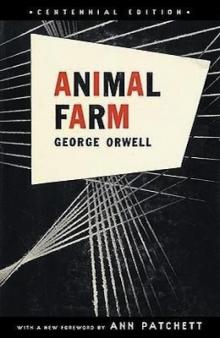 Animal Farm & 1984
Animal Farm & 1984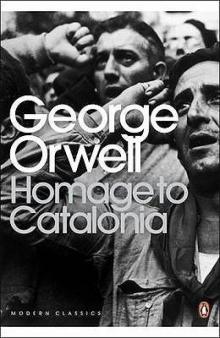 Homage to Catalonia
Homage to Catalonia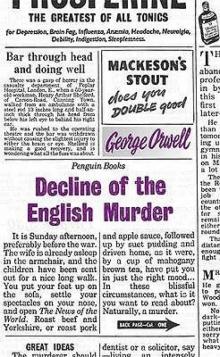 Decline of the English Murder
Decline of the English Murder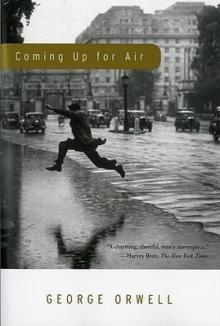 Coming Up for Air
Coming Up for Air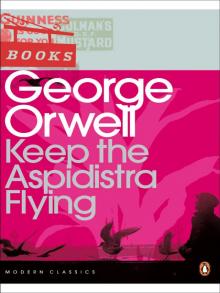 Keep the Aspidistra Flying
Keep the Aspidistra Flying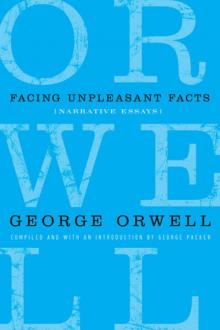 Facing Unpleasant Facts: Narrative Essays
Facing Unpleasant Facts: Narrative Essays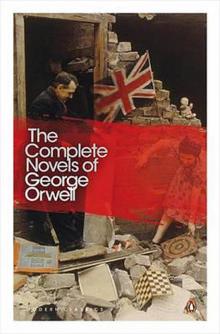 The Complete Novels of George Orwell
The Complete Novels of George Orwell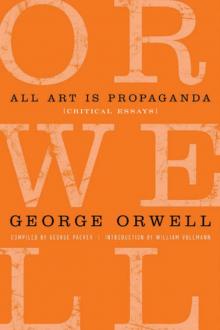 All Art Is Propaganda: Critical Essays
All Art Is Propaganda: Critical Essays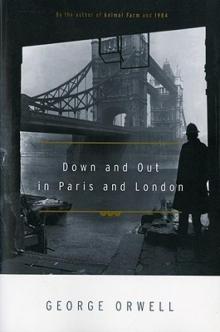 Down and Out in Paris and London
Down and Out in Paris and London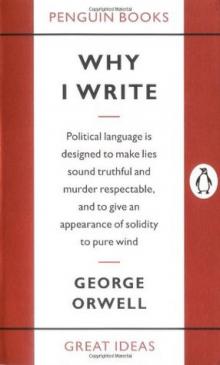 Why I Write
Why I Write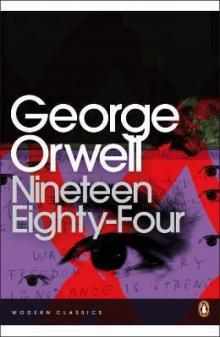 Nineteen Eighty-Four
Nineteen Eighty-Four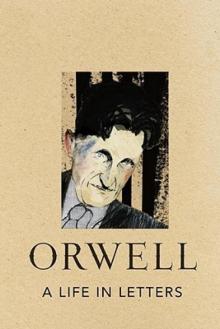 A Life in Letters
A Life in Letters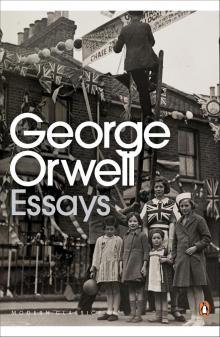 Essays
Essays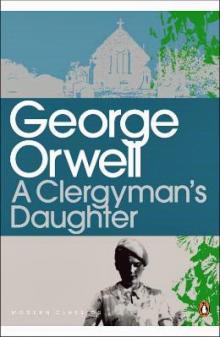 A Clergyman's Daughter
A Clergyman's Daughter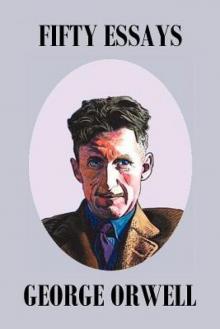 Fifty Orwell Essays
Fifty Orwell Essays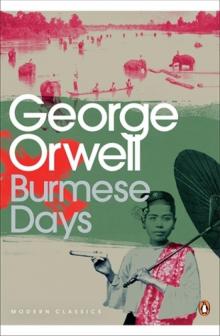 Burmese Days
Burmese Days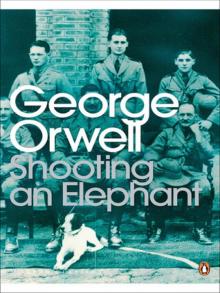 Shooting an Elephant
Shooting an Elephant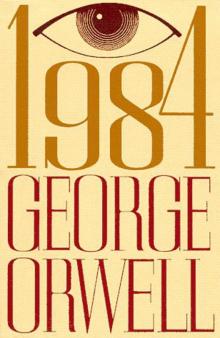 1984 (Penguin)
1984 (Penguin)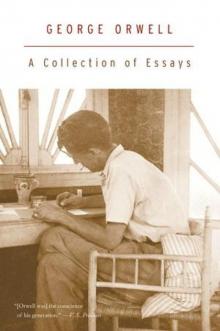 A Collection of Essays
A Collection of Essays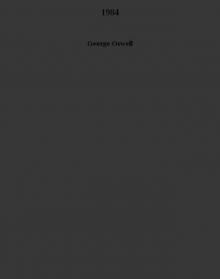 1984
1984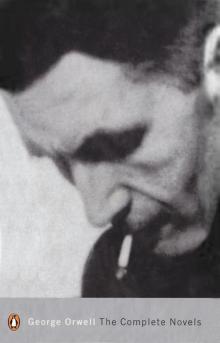 The Complete Novels
The Complete Novels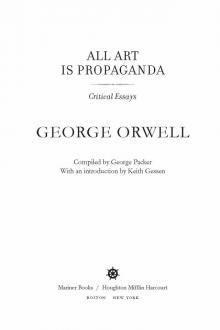 All Art Is Propaganda
All Art Is Propaganda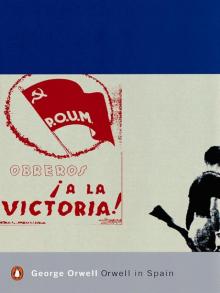 Orwell in Spain
Orwell in Spain Animal Farm: A Fairy Story
Animal Farm: A Fairy Story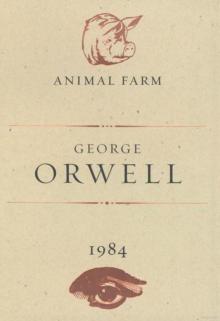 Animal Farm and 1984
Animal Farm and 1984